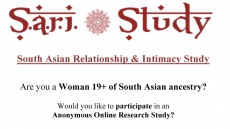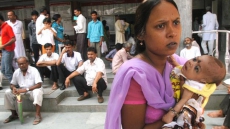While most middle- and lower-middle class mothers who travel in public transport rarely have an alternative to feeding their babies in public, women among the urban elite are making a conscious choice to nurse their children wherever the need arises.
“I do breastfeed my son in public and I think it is the most natural thing in the world,” said Melinda Kaur, mother of an eight-month-old. “Nature intended for babies to be nourished with a mother’s breast milk.
“It hurts me when I see women staring or passing comments. I understand that not all women can breastfeed. But the ones who do should not stare,” said Melinda.
Originally from Singapore, the homemaker has lived in India for nine years now. According to her, bar the odd stare, India is far more progressive than she thought it would be.
Explaining that she had not faced much difficulty nursing in public, she added, “I have fed him everywhere, in the mall, in a plane, in a park.”
“I do cover up, though,” she said, “It is no woman’s intention to flash.”
BREAST-FEEDING TIPS FOR NEW MOMS
Considered an elixir for your baby, breast milk and breast-feeding play a key role in your childs development. Over the years, the health benefits of breast-feeding have been emphasised to create awareness about the impact of nursing on the overall development of your baby.
The World Health Organization (WHO) recommends exclusive breast-feeding for the first six months. However, if we are to go by the statistics, only two out of five women initiate the practice within the first hour of childbirth.
Dr Subhashini N.S., Ayurveda expert, R&D, The Himalaya Drug Company, tells us why breast-feeding is important.

* Breast milk is the best, easiest and the most accessible source of nourishment for baby
* Breast milk helps protect babies from illness such as cold, flu, pneumonia and infections, due to the presence of immunoglobulins and antibodies
* Breast-feeding can lower the risk of type 2 diabetes as well as certain types of breast and ovarian cancer.
Breast milk provides the ideal nutrition for infants. It has a nearly perfect mix of vitamins, protein and fat. And, it is all provided in an easily digestible form. Breast milk contains immunoglobulins and antibodies that help your baby fight viruses and bacteria.
Plus, babies who are breast-fed exclusively for the first six months have fewer ear infections, respiratory illnesses, and bouts of diarrhea.
When breast-feeding, it is important to maintain breast hygiene while your breasts adjust to the new lactating state. A few tips:
* Clean your breasts and nipples properly to avoid any breast-feeding-related infections. It is advisable to simply clean your breasts and apply a nipple care butter infused with kokum butter and virgin coconut oil, which soothe, heal and protect dry, cracked and sore nipples
* To avoid unexpected leaks and stickiness after a feeding session, you can use nursing wipes enriched with coconut oil
* It is recommended that you stay away from synthetic products to clean your nipples, so opt for products with natural ingredients to treat soreness, cracks and for instant hygiene needs.

It is advisable to feed your baby as often as possible, about every two hours or so, as breast milk gets digested quickly. The best way to feed your baby (whether breast or bottle-feeding) is to first choose a calm room, away from any noise or distraction. Make yourself and your baby comfortable on a chair or couch with plenty of cushions around for support.
Breastfeeding is nature's'way of helping new mothers recover quickly from the trauma of childbirth, supporting her health, and providing the perfect opportunity to bond with the baby. Most mothers find it difficult to breast-feed in public as nursing in public is not common in India. Ensure that you do not breast-feed your baby in an unhygienic environment such as washrooms, especially when you are travelling. This can make you and your baby vulnerable to infections.
Taking cognisance of the fact that mothers need to breast-feed in a healthy and safe environment, Himalaya BabyCare has set up over 120 breast-feeding booths in Kempegowda International Airport and Rajiv Gandhi International Airport, as well as railway and bus stations in Rajasthan.





